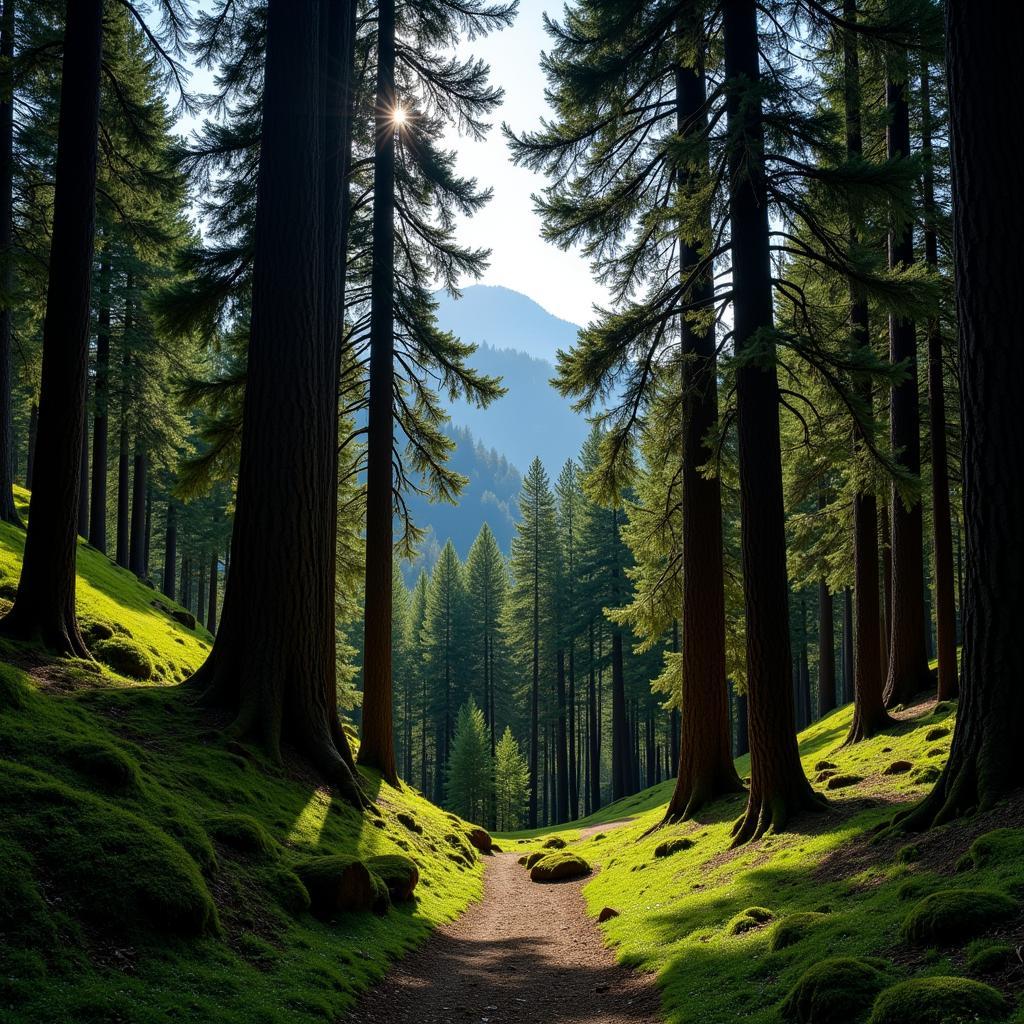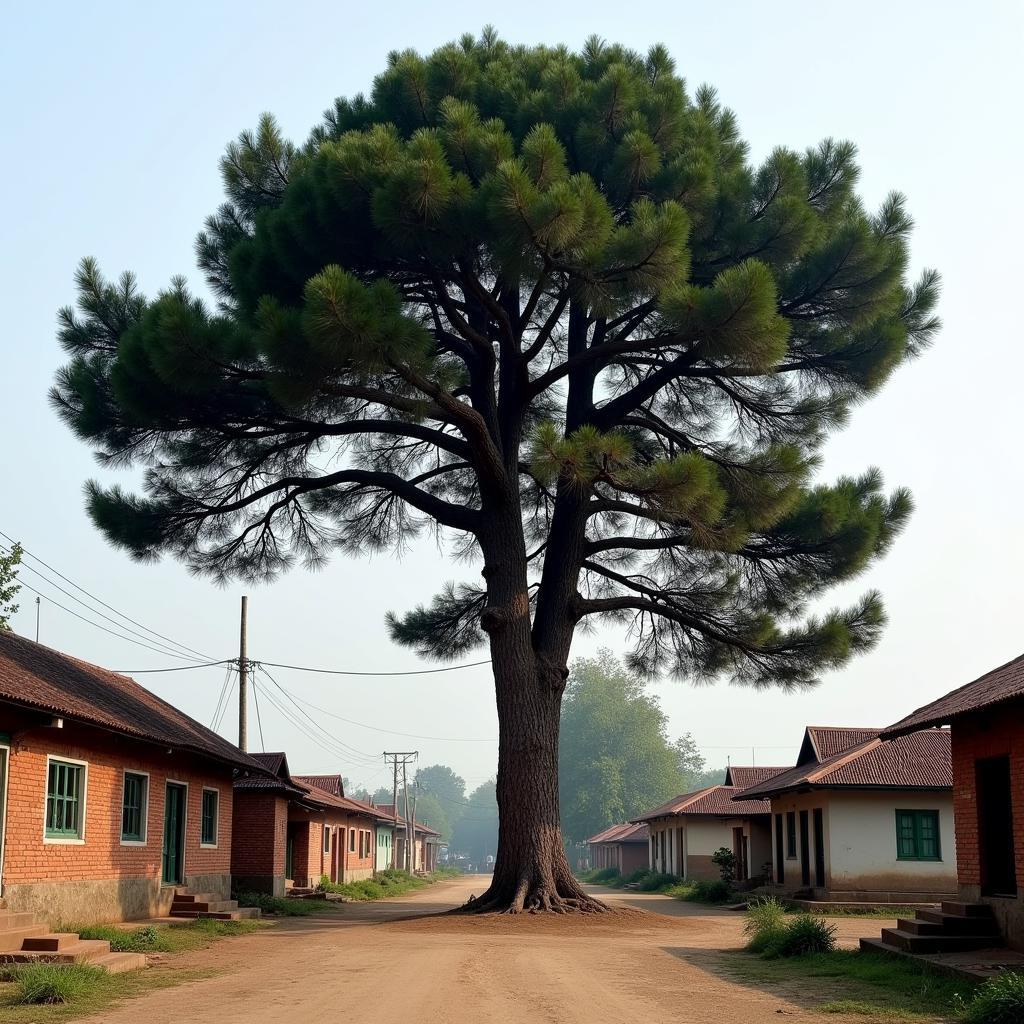The deodar tree, scientifically known as Cedrus deodara, holds a prominent place in the heart of Pakistan’s natural landscape. Revered for its grandeur and valuable timber, this evergreen giant has been an integral part of the region’s ecosystem and culture for centuries.
A Closer Look at the Deodar Tree
Towering over the Himalayan foothills, the deodar tree is a sight to behold. Its majestic height, often reaching up to 70 meters, and its graceful, drooping branches create a striking silhouette against the mountainous backdrop. The needles, a vibrant shade of green, grow in clusters along the branches, giving the tree a lush and full appearance.
 Deodar tree forest in Pakistan
Deodar tree forest in Pakistan
But the deodar tree is more than just a beautiful sight. Its wood, known for its durability and resistance to decay, has been prized for centuries in Pakistan. From intricate carvings to sturdy furniture, deodar wood has been used to craft a wide range of objects that speak to the tree’s versatility and cultural significance.
The Deodar Tree’s Significance in Pakistan
The deodar tree’s influence extends beyond its physical properties. Deeply rooted in Pakistani culture, it holds symbolic meaning, representing strength, longevity, and resilience. In local folklore, the deodar tree often features prominently, its presence a reminder of nature’s enduring power.
 Deodar tree in a Pakistani village
Deodar tree in a Pakistani village
Beyond its cultural significance, the deodar tree plays a vital role in Pakistan’s ecosystem. Its deep roots help to stabilize the soil, preventing erosion and landslides. The dense canopy provides a haven for a diverse range of flora and fauna, making the deodar forests biodiversity hotspots.
“The deodar tree is a testament to the interconnectedness of nature and culture,” says Dr. Amina Khan, a leading botanist specializing in the flora of Pakistan. “Its presence enriches our environment in countless ways, from its practical uses to its symbolic meaning.”
Threats and Conservation Efforts
Despite its resilience, the deodar tree faces growing threats. Deforestation, driven by the demand for timber and agricultural land, has led to a decline in deodar populations. Climate change poses another significant challenge, as shifting weather patterns can impact the tree’s growth and survival.
Recognizing the importance of protecting this valuable species, Pakistan has implemented several conservation efforts. Reforestation programs aim to restore degraded forests by planting new deodar saplings. Sustainable forestry practices encourage responsible timber harvesting, ensuring the long-term health of deodar populations.
The Future of the Deodar Tree
The deodar tree stands as a symbol of Pakistan’s natural heritage. Protecting this majestic species requires continued conservation efforts and a commitment to sustainable practices. By ensuring the survival of the deodar tree, we safeguard not only a valuable resource but also an integral part of Pakistan’s cultural and ecological identity.
FAQs about Deodar Trees in Pakistan
-
What is the average lifespan of a deodar tree?
Deodar trees are known for their longevity, with an average lifespan of several hundred years. Some trees have been known to live for over a thousand years. -
Where can I see deodar trees in Pakistan?
Deodar trees are found in the Himalayan regions of Pakistan, particularly in the provinces of Khyber Pakhtunkhwa, Azad Kashmir, and Gilgit-Baltistan. -
Are there any conservation programs for deodar trees in Pakistan?
Yes, there are several government and non-government organizations working towards the conservation of deodar trees in Pakistan. These initiatives include reforestation programs, community-based forest management, and awareness campaigns.
For more information about trees in Pakistan, you can visit our comprehensive guide on trees in pakistan. If you’re interested in the economic value of different tree species, check out our article on ash wood price in pakistan.
Need Assistance?
For any inquiries or assistance regarding the Deodar Tree In Pakistan or any other related topics, please don’t hesitate to contact us:
- Phone Number: +923337849799
- Email: news.pakit@gmail.com
- Address: Dera Ghazi Khan Rd, Rakhni, Barkhan, Balochistan, Pakistan
Our dedicated customer support team is available 24/7 to assist you.